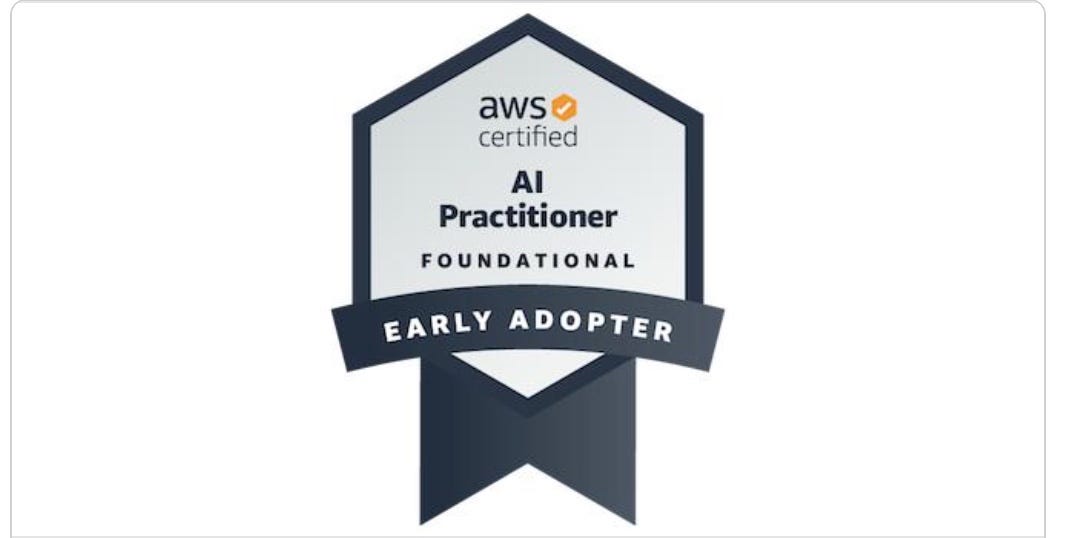AWS AI Practitioner Beta Exam: The AI Certification That Wasn't
When a "Beginner-Friendly" Exam Turns Into a ML Obstacle Course
Hey there, Digital Alchemy Lab community!
I've been a bit quiet lately, and I wanted to let you know why. I've been busy preparing for and taking the AWS Beta AI Practitioner exam. It's been quite an experience, and I'm excited to share it with you.
Why I Decided to Take This Exam
As someone working in Cloud Security and AI Security, I saw this exam as a chance to:
Deepen my understanding of AI fundamentals and how AI systems work. After all, to secure something effectively, you need to understand it inside and out.
Get a broader perspective on AI applications in AWS, which could help me anticipate and address future security challenges.
I've been working with AWS since 2016 and have taken beta exams before. I thought I knew what I was getting into. Turns out, I was in for a surprise.
What I Expected vs. What I Got
AWS describes this exam as suitable for people who are "familiar with, but don't necessarily build, solutions using AI/ML technologies on AWS." They're targeting business analysts, IT support, marketing professionals, and managers.
Based on that, I expected questions testing a broad but not too deep understanding of AI/ML concepts and their AWS applications. What I got was quite different.
The Reality of the Exam
The exam had 85 questions and covered a lot more ground than I anticipated:
Unexpected Technical Depth: Questions dug into areas like model performance, AWS service configurations, and optimization techniques. Even with my tech background, I found it challenging.
Broad AWS Service Knowledge: You needed to know a wide range of AWS services to answer the scenario-based questions.
Advanced ML Concepts: The exam covered topics like precision, recall, F1 score, BERTScore, and ROUGE in detail.
Heavy Focus on LLMs: A big part of the exam was about Large Language Models - when to use them, their limitations, and how to choose the right approach.
Retrieval Augmented Generation (RAG): There were questions on understanding RAG, comparing it with fine-tuning, and knowing when to use it.
Prompt Engineering: This was a major focus, with questions on techniques and best practices.
Some Security Questions: While not a major part, there were questions on prompt injection, adversarial attacks in LLMs, and AI security best practices.
Who Should Really Take This Exam?
After going through this exam, I have a different view on who it's suitable for:
Junior ML Practitioners: This group is probably best positioned to tackle this exam. They have the technical background to understand the concepts but might find the AWS-specific implementations challenging.
Experienced ML Practitioners: While they might find some parts easy, the focus on AWS-specific implementations could present some challenges.
Cloud Architects or DevOps Engineers with ML knowledge: Their AWS expertise would be valuable, but they'd need solid understanding of ML concepts too.
Business and Non-Technical Roles: Despite AWS targeting this group, I found the exam far too technical for those without a strong ML background. It would be extremely challenging for most people in these roles.
What to Focus On If You're Taking This Exam
If you're thinking about taking this exam, here's what I'd suggest focusing on:
AWS AI/ML Services: Really understand services like Rekognition, Comprehend, Transcribe, Amazon Bedrock, and SageMaker.
LLMs and RAG: Know the principles and when to use them.
Prompt Engineering: Be ready to discuss different techniques and their uses.
Model Evaluation Metrics: Get familiar with BERTScore, ROUGE, precision, recall, and F1 score.
Machine Learning Basics: Understand how to apply supervised and unsupervised models in real situations.
Bias and Ethics: Know how to spot and manage bias, and understand the ethical side of AI tools.
Performance Improvement: Be prepared to talk about RAG, Prompt Engineering, and Fine-Tuning.
AI/ML Security: While it's not a huge part, know about prompt injection and adversarial attacks.
My Thoughts
This was one of the toughest AWS exams I've taken, but not for the reasons you might expect. The mix of broad AWS knowledge and technical depth wasn't what I expected, especially for an exam that's supposed to be for non-technical roles.
I passed but it made me wonder if the exam is really aligned with what AWS says it's for. It's somewhere between a high-level business exam and a technical specialist certification, leaning more towards the technical side.
If you're thinking about taking this exam, be ready for a more technical challenge than you might expect. Even if you know AWS well, you'll run into ML-specific concepts that might push you.
Have any of you had similar surprises with tech certifications? I'd love to hear about your experiences in the comments.
Remember, in our fast-changing tech world, staying curious and always learning is key. Keep experimenting, keep learning, and keep turning your knowledge into practical skills.
Until next time, happy learning!


